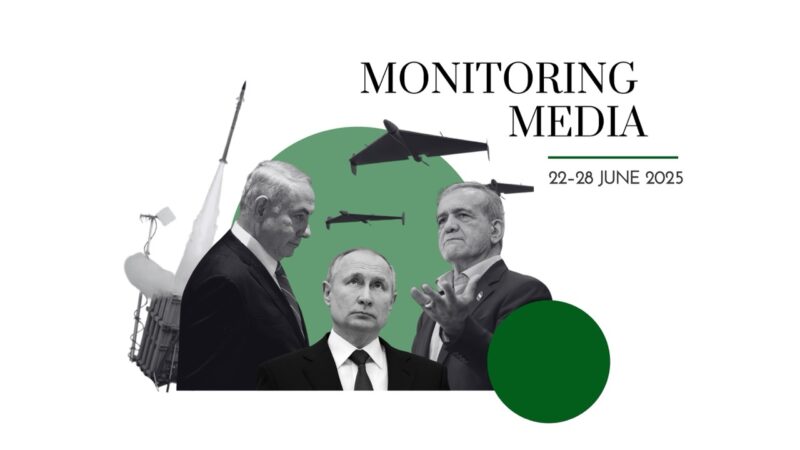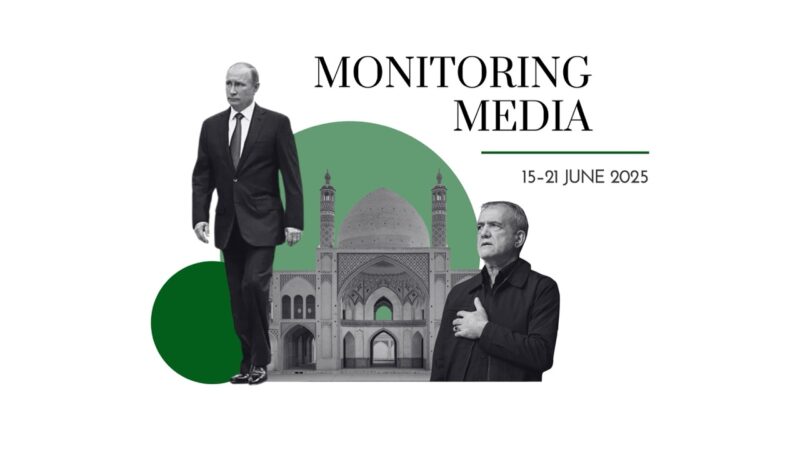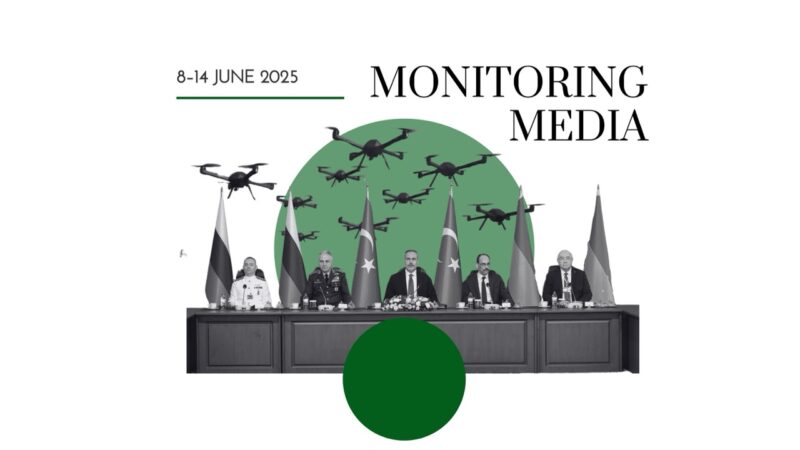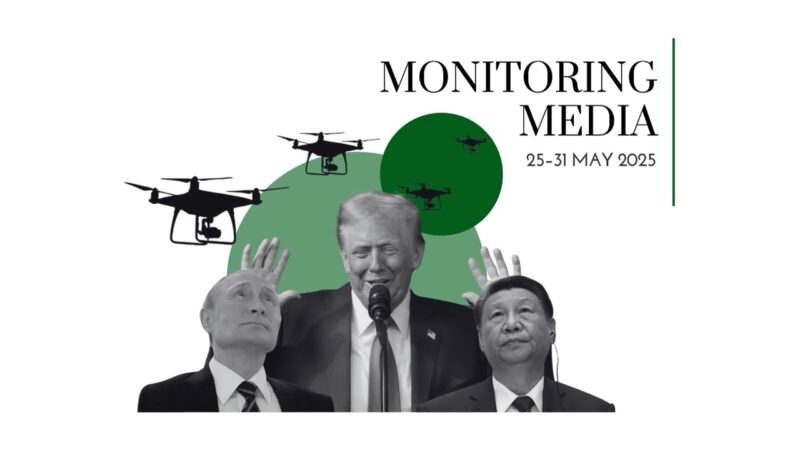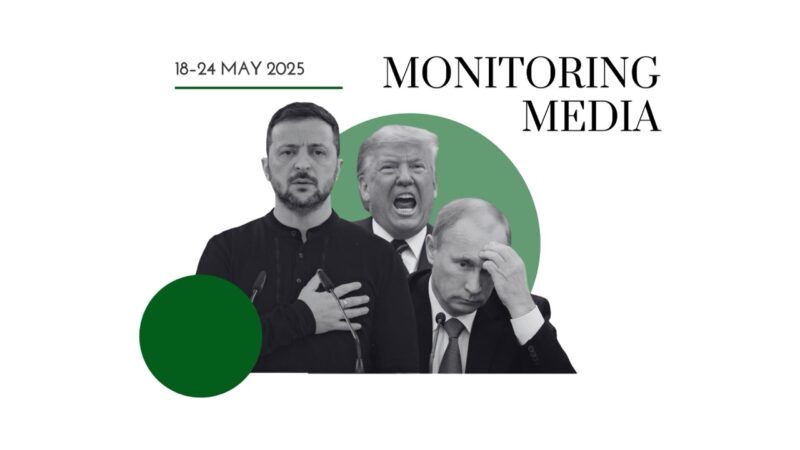Four myths about Ukraine that are not true

CIUS weekly report on North American media coverage of Ukrainian affairs, 18–24 February 2024
Six publications (Politico, Foreign Policy, The National Interest, Wall Street Journal, Vancouver Sun, and Toronto Star) were selected to prepare this report on how Ukraine has been portrayed in the North American press during the past week. The sample was compiled based on their impact on public opinion as well as on their professional reputation, popularity among the readership, and topical relevance. These publications represent centrist viewpoints on the political spectrum.
This MMS report covers only the most-read and relevant articles about Ukraine, as ranked by the respective North American publications themselves in the past week. Its scope covers promoted articles on home pages and articles from special sections on Ukraine, with the hashtag #Ukraine, from the paper editions of the publications, and about Ukraine from opinion columns and editorials.
Topics featured in the selected articles:
- The world and Ukraine: Intelligence diplomacy plays a key role in countering Russian aggression; four myths about Ukraine that are not true.
- Russia at war: EU must respond to the murder of Alexei Navalny; five ways the EU can help stop Russian aggression.
MMS summaries:
How should the US respond to Navalny’s murder? Sam Greene (National Interest) argues that the killers of Russian opposition politician Alexei Navalny should be brought to justice. “President Joe Biden’s promise that Moscow will face ‘devastating consequences’” must be fulfilled. Moscow has already been subject to powerful sanctions because of Russia’s war against Ukraine. However, it does not mean that Washington cannot additionally hold Moscow accountable for this specific crime. According to Greene, five key policies “can have a genuine impact on the Kremlin, on the prospects for Putin and those who challenge him, and on the longer-term future of Russian politics.” First, the US should integrate addressing the issue of political prisoners into its Russia policy. After all, Navalny was not the only one: “The Russian human rights organization Memorial, now forced to operate from exile, estimates that there are nearly 700 people being held in Russian prisons for the crime of being brave enough to stand up against Putin, his war, and his campaigns of domestic repression.” Second, the US should support victims of political repression with real, material power. Thirdly, the US and Europe should open avenues for asylum and shelter for Russian citizens fleeing repression and the war. Fourth, the United States and Europe should officially cut ties with Russian law enforcement agencies until their criminal elements are brought to justice. Fifth, the clearest way to honour Navalny’s legacy is to commit to Russia’s military defeat in Ukraine. The claim that de-escalation in Ukraine could lead to de-escalation in Russia itself is false. According to the author, these five steps will not produce immediate results, but “they can impose real costs on the Kremlin, by bolstering the opposition’s ability to withstand repression, undermining the effectiveness of Putin’s police state, recommitting to defeating Putin on his most important battlefield, and giving Russia’s future leaders clear incentives to make fundamental change.”
Intelligence diplomacy plays a key role in countering Russian aggression. Brett M. Holmgren (Foreign Policy) notes that the world today is in an era of intelligence diplomacy. While the USA’s debacle in Iraq showed the risks of this political tool, Russia’s war against Ukraine has demonstrated its possibilities. On the eve of the full-scale invasion of Ukraine, intelligence diplomacy helped to strengthen Kyiv’s ability to defend its sovereignty and territorial integrity: “Exposing Russia’s plans in advance did not avert war. But U.S. intelligence disclosures enabled Ukraine to defend itself, mobilized allies and partners to support Kyiv, undermined Russian disinformation in the eyes of the public, and restored the credibility of U.S. intelligence—and of the United States—in the eyes of the world.” For example US intelligence diplomacy revealed Moscow’s attempts to “fabricate so-called ‘false flag’ atrocities to justify an invasion of Ukraine.” According to the author, the success of intelligence diplomacy in countering Russian aggression was thanks to: (1) decisive action of top US leaders in disseminating the intelligence information at their disposal; (2) a principled and clear political intention of the US “to prevent war”; (3) specific, consistent, and accurate intelligence on Moscow’s intentions; and (4) “new open-source data on Russian activities, such as commercial imagery and social media.” The successful experience in Ukraine also demonstrates its potential applicability in other global conflicts. However, without proper oversight the use of this tool can create additional risks to national security. Holmgren concludes that in the modern world we cannot afford to treat intelligence solely as an analytical resource but instead should consider it “as a critical enabler of U.S. diplomacy on the frontlines of our competition with strategic adversaries. With the right safeguards, intelligence diplomacy will play a critical role in securing America’s future.”
Five ways the EU can help stop Russian aggression. Gabriel Gavin, Koen Verhelst and Victor Jack (Politico) argue that decimating Moscow’s treasury would stop Russia’s war against Ukraine. To achieve this, it is not necessary to impose individual sanctions against Russian companies; rather, it’s enough to hit the sources of Russia’s revenues. According to the authors, five extremely effective steps could force Russia to end the war. First, Brussels should adjust the oil price cap: “Before the start of the war in Ukraine, oil and gas sales accounted for almost half of Russia’s revenues. Now, with companies and skilled workers fleeing the country, fossil fuels are one of the few lifelines it has left,” but so far Moscow has found ways to circumvent the rules—including the use of a “shadow fleet” and third states. Second, because about “80 percent of lucrative trade in metal with Russia is not currently sanctioned,” the EU must shut down Moscow’s metals exports. Third, European states should turn off the gas taps, for despite much that the EU has done to avoid consuming Russian gas, “around 15 percent of gas imports last year” came from Russia, and “EU gas payments to Russia over the past two years have topped €80 billion.” Fourth, Brussels should firmly oppose intermediaries. States such as “Turkey, India, and China all have cashed in on Moscow’s need for alternative trade routes, with Beijing shipping tons of hardware that could easily be used by Russian forces fighting in Ukraine.” Last but not least: Europe must say no to Russian nuclear energy. Although this sector is not extremely lucrative for Moscow, “it offers a huge soft power lever and gives Russian state companies access to sensitive European infrastructure.” The authors are confident that such steps would sooner or later force Moscow to stop its aggression.
Four myths about Ukraine that are not true. Eric Edelman and David J. Kramer (Politico) note that the two years of Russia’s war against Ukraine have dispelled some myths about Ukraine, yet also created new ones. These new myths, fuelled by Russian propaganda, could hinder Washington’s support for Kyiv and thus harm the US itself. According to the authors, four myths in particular weaken US support for Ukraine. The first myth states that “U.S. support will feed an endless war with no possibility of Ukrainian victory.” This belief is manifestly not true. During these two years of full-scale war, Kyiv has liberated a significant part of the territory occupied by Russia since 2014. Moreover, Ukraine has cut Russia’s “conventional capabilities in half, according to estimates from the U.K. chief of defense and the U.S. Director of Central Intelligence. According to Estonia’s Foreign Intelligence Service, Russia has lost 8,300 armored fighting vehicles in Ukraine; this includes 2,600 tanks, 5,100 armored personnel carriers, and 600 self-propelled artillery units.” These impressive results cost the United States “less than 4 percent of the Pentagon’s annual budget.” The “endless war” myth fuels a second myth, that now is the time to reach a cease-fire and start peace talks. In actuality Russia does not want to negotiate, despite its public statements, which “are belied by Russian actions on the ground, including the apparent execution of wounded Ukrainian POWs in Avdiivka and the continued bombardment and killings of Ukrainian civilians, atrocities denied by Russian officials.” Moreover, a ceasefire would simply give Moscow the opportunity to recover its losses and start a new round of violence in Europe. The third myth is that Ukraine is corrupt and run by neo-Nazis—this is also nonsense. Ukraine is led by a Jewish president, and according to an “Anti-Defamation League survey, Ukraine has experienced a significant drop in antisemitic attitudes in recent years.” Similarly, “tolerance for corruption among Ukrainians after the full-scale invasion has dropped significantly.” The last myth is that support for Ukraine would distract the US from key challenges: China and the Middle East. But the threat from China is hypothetical, while the threat from Russia is a going concern—after all, Russia invaded a neighbouring state and seriously damaged the security system of Europe, a key partner of the US. “In dollar terms, Europe is providing more economic assistance to Ukraine than we are […]. As a percentage of GDP, the United States ranks 15th globally in terms of security assistance provided to Ukraine.” According to the authors, “the best strategy for the United States should be Ukrainian victory and Russian defeat—driving every Russian occupying soldier off Ukrainian territory, holding Russia accountable for the war crimes it has committed, and seizing Russian frozen assets to help cover the cost of the destruction Putin has caused.”
US leaders fail to deliver crucial narrative on Ukraine strategy. William McGurn (Wall Street Journal) argues that the prevailing current discourse on Ukraine juxtaposes Joe Biden and Donald Trump as opposites, particularly regarding military aid to Kyiv, but both leaders lack a strategic articulation of their positions. Biden emphasizes the importance of not conceding victory to Putin without explicitly backing a Ukrainian triumph, while Trump dismisses providing anything to Kyiv except loans as “stupid.” The lack of a substantial debate between the two leaves the American populace without a vital discussion on desired outcomes and their rationales. As a result, US policy on Ukraine has drifted into ambiguity and fails to address key geopolitical implications, such as deterring aggression from adversaries like Russia and China. “As expensive as aid might be, the Ukrainians are inflicting enormous damage to a U.S. adversary with a history of aggression toward its neighbors,” the author stresses.
West uncertain on responding to Putin critic Alexei Navalny’s death. Allan Woods (Toronto Star) writes that the death of Russian political activist Alexei Navalny in a Siberian prison camp has sparked international concern and calls for action against President Putin. Navalny’s supporters suspect foul play, citing unusual signs of bruising on his body consistent with convulsions and attempts to restart his heart. However, with Russia conducting its own investigation, including an autopsy, definitive answers are unlikely. In response to Navalny’s death, world leaders are considering various options, including economic sanctions, public condemnation, and support for opposition parties. Yet, there is hesitation due to concerns about potential escalation and the broader implications of such actions: “At its worst, escalation could lead to a wider war that spills over Ukraine’s borders and compels NATO member states to fight, or to a nuclear conflict. Escalation could also lead to harsher treatment or imperil the negotiated release of other political prisoners or opposition figures currently serving time in Russian jails,” including figures like Vladimir Kara-Murza.
Without Western aid, Kyiv would have to choose between front-line defence and civilian protection. Jillian Kay Melchior (Wall Street Journal) outlines three critical factors shaping the outcome of the war in Ukraine: manpower, money, and materiel. “Ukrainian determination to resist Russian subjugation is the only resource that remains in plentiful supply. That won’t be enough for victory,” Melchior emphasizes Russia’s recent capture of Avdiivka underscores the urgent need for international aid, particularly in ammunition and air defence systems. Despite Ukraine’s adept use of drones and substantial military aid to date from the US and EU, due to limited recent deliveries Ukraine is facing increasing pressure to balance front-line protection with urban defence against Russian missile and drone attacks. The author highlights several key issues for Kyiv, including the notable ammunition gap between Ukraine and Russia, the constraints of drone tactics in addressing artillery deficiencies, and the economic strains exacerbated by the ongoing war. Melchior underscores the US Congress’ pivotal role in decision making to address Ukraine’s urgent military requirements amidst unrelenting Russian attacks: “If Congress shrugs, the consequences could be dire. As Ukraine depletes its air defenses, it will increasingly be forced to choose between protecting troops at the front and shielding cities from Russian missile and drone attacks.”
As US commitment to Ukraine wanes, questions arise about European security. Yaroslav Trofimov (Wall Street Journal) reminds readers that Russian leader Vladimir Putin’s gamble in 2022, anticipating Western fatigue and acquiescence to Ukraine’s dismemberment, met unexpected resilience from Ukraine and increased European solidarity. But the United States, whose domestic partisan divisions are exacerbated by Moscow’s influence, is currently stalling critical military aid to Ukraine. Former Ukrainian defence minister Andriy Zagorodnyuk warns that failure to address this crisis risks becoming “a huge gift to Putin,” reinforcing the pivotal role of US assistance in maintaining Ukraine’s defence capabilities. Meanwhile, Moscow’s objective of gaining control over the entirety of Ukraine remains unchanged. The reluctance of some Republican congressmembers to provide further funding for Ukraine, coupled with the spectre of a potential return to isolationist policies under a second Donald Trump presidency, underscores concerns about America’s commitment to its allies and the broader global security landscape, according to Trofimov. European efforts to bolster Ukraine’s defence capabilities through increased military cooperation and production signify a growing realization of the broader implications of Ukraine’s fate. As military analyst Franz-Stefan Gady emphasizes in his interviewed with the author, the outcome of the war in Ukraine carries significant consequences for the security architecture of the entire continent, necessitating sustained international support to deter further Russian aggression and preserve European stability.
As war drags on, Ukraine’s resilience in dire need of Western support. Anastasiia Nikulina (Vancouver Sun) paints a vivid picture of life under the constant threat of violence. Recounting the personal experiences and harrowing realities faced by fellow Ukrainians, the author describes both persistent trauma and enduring resilience amidst relentless attacks. Despite profound suffering and loss, there remains an unwavering determination to resist and prevail. As Nikulina puts it: “God has no hands other than ours,” illustrating the collective resolve to persevere and reclaim their homeland from the invading forces. In addition to highlighting the profound human cost of the war, the author emphasizes the crucial role of international support and solidarity in Ukraine’s struggle for survival. With poignant accounts of friends and acquaintances directly impacted by the violence, the author underscores the urgent need for continued assistance from the global community. “And we need money to live and to donate. We give our money to buy evacuation vehicles for the wounded. We buy drones, medical devices, thermal imaging cameras. We are not a rich country and we are at war, but we buy life with our money because who else will?”
